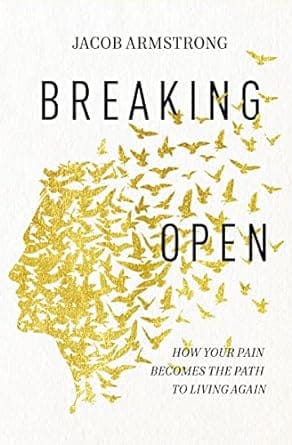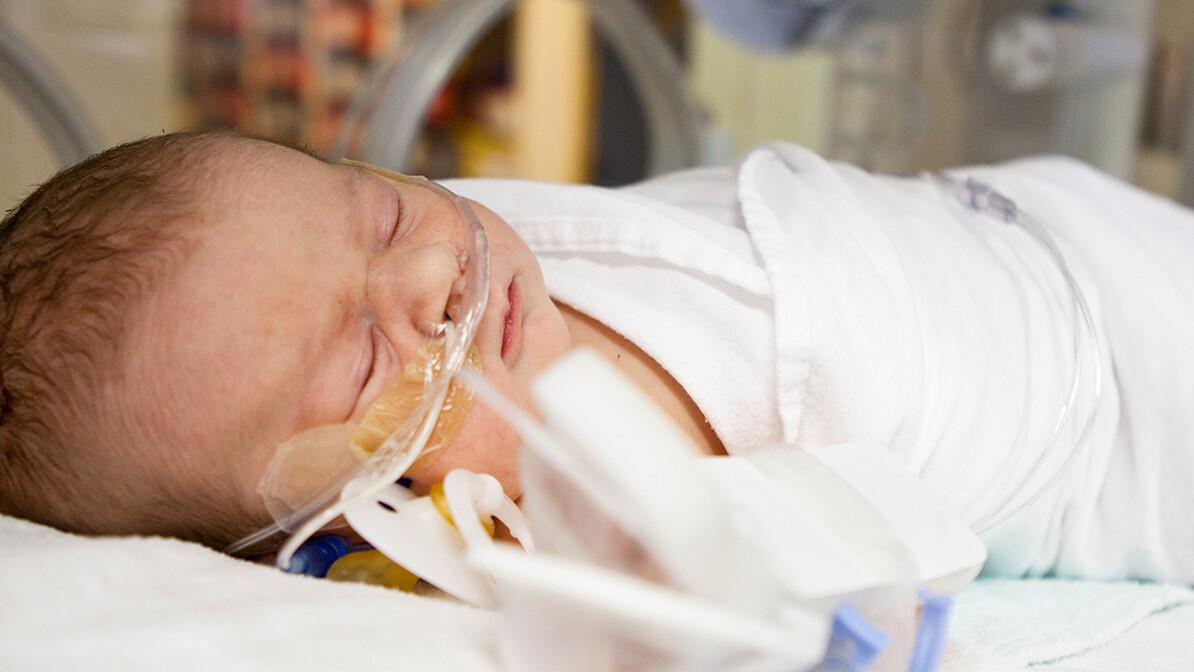
Miracles, Not Manipulation
 Excerpt taken from BREAKING OPEN: How Your Pain Becomes the Path to Living Again by Jacob Armstrong.
Excerpt taken from BREAKING OPEN: How Your Pain Becomes the Path to Living Again by Jacob Armstrong.
Chapter 8
Miracles, Not Manipulation
Brian and Hollie, who are some of our best buds, told us they were adopting a child.
When they gave us this surprising news, we had many similarities and shared experiences. They had two daughters the same age as our two daughters. We went to the same church and the same schools and played the same sports. We swam in their pool. We don’t have a pool, but I’m sure we contributed something to their lives. In our group of friends with Brian and Hollie we have watched our kids grow up — really, we’ve watched ourselves grow up — and it’s been a strength to do all the life together. It feels like we have gone through it all — lost jobs, illnesses, graduations, promotions, demotions, even death.
Brian and Hollie had been approved to adopt a son from Ethiopia at the same time Rachel was pregnant with our third child, Phoebe. We followed their travels closely. We prayed for them and bought them baby gifts. We would even join them at our local Ethiopian restaurant as we dreamed about life with their new son and tried to learn more about his culture. (Don’t miss out on the fulmedames. It’s spicy beans and you can eat them for breakfast. You heard me.)
I remember when they learned their new son’s Ethiopian name: Tamirat Yishak. We would all try to say it correctly. We are Southerners. It was funny. With my limited language skills, I could recognize Yishak as the Ethiopian version of the name Isaac. In the Bible Isaac was the unexpected son to Abraham and Sarah, who were too old to have children. His name literally means “he laughs,” meaning Abraham and Sarah laughed when they found out they were having a son in their old age (Genesis 17:17; 18:12; 21:6). They laughed with joy, with surprise, with wonder. We laughed thinking about Brian and Hollie traveling to the other side of the world to bring home a son — laughs of joy and surprise and wonder. Wondering what it would mean for our lives.
The name, Tamirat, though, was a new one for us. One night at the Ethiopian restaurant Brian asked the waitress what the name Tamirat meant.
The waitress said, “America.”
Brian and Hollie thought that was strange, a son named “America.” As they discussed it with the waitress, trying to overcome accents and language barriers, the owner of the restaurant came out of the kitchen trying to clear up the confusion.
He said, “No, no, no, you misheard her. His name does not mean ‘America.’ ” He paused. “His name means ‘a miracle.’ ”
Brian and Hollie decided to keep the name his birth parents had given him. Tamirat Yishak. We all call him Ty for short. He is our miracle.
Ty and my daughter Phoebe, now eleven, have grown up together since they were babies. They are both spirited and they have had many a disagreement and more than one argument over a toy. They laugh together, they cry together, they swim together (in Ty’s pool). They get on each other’s nerves. Sometimes they play for hours without noticing the passage of time. When our families are together, five girls and one boy (sorry, Ty!), it is a mess. Things get broken. We mess up the kitchen. Mud is tracked in on the floor. It’s loud. It’s life.
And, while Ty is just a normal part of our lives now, at least for us old folks, we never lose sight of the miracle, which happened right in the midst of our already full, messy lives. When Brian and Hollie, who seemingly already had all they would ever need, felt an ache. It was an ache in their spirits caused by the Spirit, and they broke open and brought home a son.
A shift in the broken-open life — okay, the shift in the broken-open life — is to expect miracles to happen. Before we are born again, we manipulate situations. We manipulate other people. We manipulate our lives in the hope that they will end up looking the way we hoped. Let’s face it: the more junk we encounter in life, the more likely we are to try to make sure everything goes the way we want.
But, when we find space, in whatever pace we may be in . . .
When we climb out of the hole, and we rise up after years of hunkering down . . .
When we get desperate for God, not just dramatic about circumstances . . .
When we realize we can’t be certain about everything, but we find clarity at the feet of Jesus . . .
When we leave haughtiness and pursue holiness . . .
When we choose vulnerability over capability . . .
And when we break, but break open . . .
We get to see miracles.
When our eyes begin to look for what God is doing, when we stop trying to control everything, we see that God is doing things that we simply cannot do.
I believe in miracles. I get that that is a loaded statement. I know you have seen people try to manipulate miracles from Jesus. And not just slick traveling preachers staging people standing up from their wheelchairs. Normal people like us, if we aren’t careful, when we are in the midst of brokenness, will try to use Jesus as a cosmic bellhop who we hope will move our baggage from one place to the next. Miracles don’t work that way. But Jesus is still in the miracle business.
If we are honest about our brokenness and our inability to manipulate the miraculous, we will begin to see what he is up to in our lives. It is always good, and it is always redemptive, and it is always outside of our control.
I got a phone call recently from a Canadian professor. Well, a guy who is a professor in Canada. I don’t think he is Canadian. I think he is from North Carolina. But he teaches in Vancouver. He was writing a book on places where the church in North America is experiencing new life. What might be called miraculous growth in a time when many churches are on life support. He had heard about our church, Providence Church, and wanted to ask some questions.
The questions were what I would expect from someone writing a book on church growth. But then, at the end, he said, “I do have one more question to ask.” He seemed almost afraid to continue. Then he said, “I’ve been talking to people in churches all over the country, big churches, small ones, and there seems to be one common factor.” He had my attention, but he was still dragging his feet. He said, “They all seem to have experienced a miracle early on in their story. Have you all seen any miracles?”
“Yes,” I said. And even as I said it, I was seeking to find disclaimers, just like him, so I didn’t sound too weird.
I told him about how in our first year, I received a phone call in the middle of the night. I was a twenty-seven-year-old pastor, less than a year into starting a new church. It was my first middle-of-the-night call as a pastor. I paced the floor while I heard a panicked mom tell me her son and his friend had been in a car accident near where I lived. They were on a helicopter headed to the hospital. She asked me to come.
I arrived in the downstairs lobby of Vanderbilt University Medical Center while the boys were in surgery. I had been in this lobby several times during the day. It is a large, spacious room, open in the middle, with different levels where, during the day, there are literally hundreds of people packed in waiting areas while family members are upstairs in operating rooms. That night, there was one huddled group in a darkened corner — the parents of two boys who attended our new church. We learned that both boys, Michael and Doug, were in serious condition. I was there when we learned that Doug’s neck was broken and he was paralyzed. I was there later that week when they told us he would never walk again. It was that day in the trauma unit when Joe, Doug’s uncle and legal guardian, asked me if I would ask God to heal Doug.
In that hospital room I looked at Doug, who was a few weeks from high school graduation, now lying motionless with a big contraption around his neck, beads of sweat on his brow, a grimace on his face. I really didn’t have the faith in that moment to ask for him to be healed, but his uncle had asked me, and so I went to a sink and put water on my hand. I had heard about anointing with oil, but I thought water would have to work. I made the sign of the cross on Doug’s forehead and somehow, vulnerably, knowing I wasn’t capable, man-aged the words, “Doug, I anoint you in the name of Jesus, and pray that you would be healed.” I asked for a miracle that I knew was so far beyond my control. He didn’t move a muscle.
Some weeks later they moved Doug from Nashville to Atlanta to a center that specialized in spinal injuries and paralyzed people. I visited Doug there. I remember him flirting with the nurses and struggling to move his legs. And then some weeks after that I was standing up front at Stoner Creek Elementary where our new church was meeting. (Yes, Stoner Creek. I know. Stay focused.) I was standing up front beginning my sermon, when I looked up and there was Doug. He was walking down the middle aisle with the use of a walker. The small crowd of people in attendance rose to their feet and applauded. They cheered. Our miracle. God’s miracle. Doug was walking again. Our community had been broken over his condition. We had questioned. We had cried. And now we rejoiced.
I told the professor, “Yes, there has been a miracle or two.”
…
Order your copy of BREAKING OPEN: How Your Pain Becomes the Path to Living Again by Jacob Armstrong. Copyright © 2022 by Jacob Armstrong. Used by permission of Thomas Nelson Publishing.
Trending Now
Sign up today for your Inspiration Today Daily Newsletter
Supercharge your faith and ignite your spirit. Find hope in God’s word. Receive your Inspiration Today newsletter now!
Jacob Armstrong
Jacob Armstrong is a published author, speaker, and pastor of
Providence Church in Mt. Juliet, Tennessee. Jacob and his wife, Rachel,
founded Providence Church in 2008 with a vision to see people who
feel disconnected from God and the church find hope, healing, and
wholeness in Jesus Christ. Providence Church has been one of the 100
fastest growing churches in the nation the last three years. Learn more at Jacob-armstrong.com
Related Articles
February 13, 2026
How to Find Joy in the Midst of Sorrow
Sorrow has a way of arriving uninvited—and staying longer than we expect. Loss reshapes our lives,…
January 30, 2026
What’s Happening to Your Family?
Families around the world are facing challenges that feel heavy, confusing, and unfamiliar. This…
January 14, 2026
How to Build a Stronger Marriage
When the same arguments keep resurfacing and distance quietly grows, it’s easy to feel stuck. If…
August 23, 2025
If God Is a Loving God, Why Is There So Much Pain in This Life?
Why is there so much pain in this life? This heartfelt article wrestles with that question through…
Next Steps To Strengthen Your Walk
Inspiration Today Newsletter
Supercharge your faith and ignite your spirit. Find hope in God’s word. Receive your Inspiration Today newsletter now!
Christian Articles
Find articles to strengthen your walk and grow your faith. We have a wide range of topics and authors for you.
Submit A Prayer Request
We are here for you. Simply click on the button below to reach us by form, email or phone. Together we will lift our hearts and voices with you in prayer.





